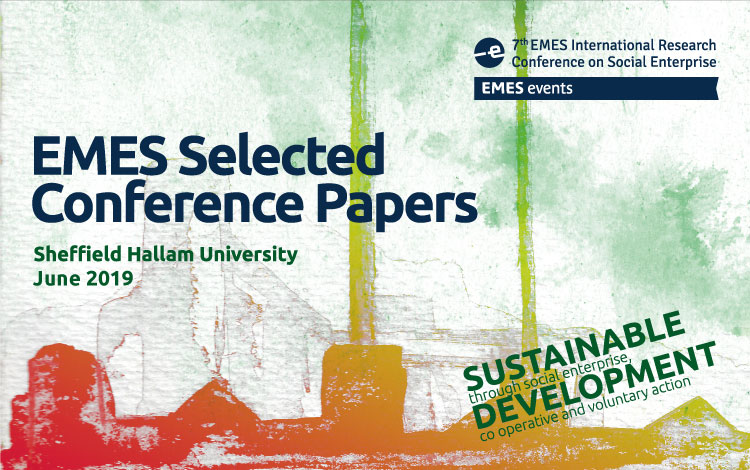The 7th EMES Selected Conference Papers (ESCP) series is now published following the last conference in Sheffield in June 2019. The texts were selected based on the evaluation of the session chairs and this initial batch is composed of 18 articles ready to download and share widely, including the Best Papers to which we will devote a specific blog entry shortly.
The other 18 papers cover a vast area of research topics including bottom-up dialogue at the local level, participatory local governance, social innovation and policy, social and solidarity economy, empowerment, the commons; scaling up and replication; crowdfunding, resource optimization, impact investment and how to invest in wind energy; critical work on the notion of SE itself; as well as reflections on what factors affect the choice of structures when setting up social enterprises. Cases described as well as countries of origins of the authors include Bolivia, Denmark, Finland, Italy, Japan, The Netherlands, Peru, Sweden, United Kingdom, etc.
These are the 18 papers:
- Andrea Bassi and Alessandro Fabbri (2019) “Crowdfunding: Threat or Opportunity for Social Economy? Third sector organisations and social enterprises facing the challenge of ICT funding strategies”, University of Bologna (Italy)
- Luigi Corvo, Lavinia Pastore and Emanuele Doronzo (2019) “Does collaborative orientation boost the performance of social enterprises?” (Italy)
- Timothy Peter Curtis (2019) “Locally Identified Solutions and Practices: a critical realist investigation into the geographies of social innovation in the context of neighbourhood policing“, The University of Northampton
- Maarten Hogenstijn (2019) “Developing dialogue bottom-up: social enterprises and local government in the Netherlands”, Amsterdam University of Applied Sciences (The Netherlands)
- Esben Hulgaard and Elof Nellemann Nielsen (2019) “Network and partnerships in a local eco-system for Social Enterprise“, VIA University College (Denmark)
- Jimin Jeon (2019) “Text network analysis on impact investment to promote social economy in developing countries“, Yonsei University (South Korea)
- Nadia Johanisova (2019) “What assumptions behind social enterprise definitions and discourses?”, Masaryk University, Brno (Czech Republic)
- Laura Kumpuniemi (2019) “Political practice and dimensions of solidarity economy: a case study from Cochabamba, Bolivia“, University of Eastern Finland (Finland)
- Hellen López-Valladares (2019) “How social innovation can challenge the degree of empowerment? The case of the first social enterprise empowering artisanal fishermen in Peru“, Pontificia Universidad Católica del Perú (Perú)
- Maureen McCulloch and Rory Ridley-Duff (2019) “To profit or not to profit? That is the wrong question”, Sheffield Hallam University, England (United Kingdom)
- Jules O’dor (2019) “Kite-marks, standards and privileged legal structures; artefacts of constraint disciplining structure choices“, Sheffield Hallam University, England (United Kingdom)
- Victor Pestoff (2019) “Work Environment, Governance and Service Quality in Japanese Healthcare”, Ersta Sköndal Bräcke University College, Stockholm (Sweden)
- Jacques Liouville, Guillaume Martin, Jean-Paul Méreaux (2019) “Optimisation of resources, skills and organisational capabilities in the BOP environment. Application of the “entrepreneurial bricolage” concept to the social enterprise 1001fontaines in Cambodia” (France)
- Masanari Sakurai (2019) “Why did the new NPO corporations diffuse? Reason for the increasing social economy organizations in Japan“, Ritsumeikan University (Japan)
- Irina Sinziana Opincaru (2019) “Elements of the institutionalization process of the forest and pasture commons in Romania as particular forms of social economy”, University of Bucharest (Romania)
- Lauren Tuckerman, Julie Thomson and Geoffrey Whittam (2019) “Open Social Innovation: Knowledge commons and the openness spectrum in Scottish social enterprise“, Glasgow Caledonian University, Scotland (United Kingdom)
- Jez Hall and Matthew MacDonald (2019) “Participatory local governance and social enterprise: exploring the links between social entrepreneurial behaviour and democratic resource allocation through participatory budgeting”, (United Kingdom)
- Irene Kalemaki, Ioanna Garefi, Sofia Kantsiou, Ivan Diego, Aristidis Protopsaltis, Jenifer Clare Wall (2019) “Towards a learning framework for social innovation education” (Greece, Spain, Germany, United Kingdom)
- Ela Callorda Fossati, Florence Degavre and Benoît Lévesque (2019) “Innovation and transition. For a dialogue between the strong conception of social innovation and the multi-level perspective of the transition toward sustainability” (France)
- Vander Luiz Aguiar, Armindo dos Santos de Sousa Teodósio and Walter Mswaka (2019) “Social enterprises of urban agriculture and the resilience in cities: Belo-horizontinos and Londoners popular movements that defy the hegemony neoliberal” (Brazil, United Kingdom)
We would like to thank all the authors and conference session chairs, as well as the organising committee, for the investment made in launching this new series.

